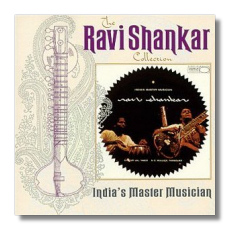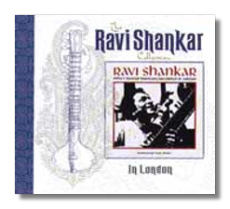
The Internet's Premier Classical Music Source
Related Links
- Latest Reviews
- More Reviews
-
By Composer
-
Collections
DVD & Blu-ray
Books
Concert Reviews
Articles/Interviews
Software
Audio
Search Amazon
Recommended Links
Site News
 CD Review
CD Review
The Ravi Shankar Collection

India's Master Musician
- Kafi-Holi (Spring Festival Of Colors)
- Dhun
- Mishra Pilco
- Raga Puriya Dhamasbri
- Raga Charu Kishi
Ravi Shankar, sitar
Chatur Lal, tabla
N.D. Mullick, tamboura
EMI Angel CDM 67023 ADD 48:38


Recorded In London
- Raga Hamsadhwani
- Dhun Kafi
- Raga Ramkali
Ravi Shankar, sitar
Kanai Dutt, tabla
Nodu Mullick, tamboura
EMI Angel CDM 67024 ADD 46:48
If your experience with Indian "classical" music is limited to what gets played in the background at your favorite curry house, then consider putting yourself in the hands of Ravi Shankar and finding out how good this music is when you actually listen to it. Everyone knows Shankar's name, but few people actually sample his work. Here's your chance: these excellent reissues from the World Pacific label (a division of Capitol) should be easy to find, and they are mid-priced.
The sitar is an instrument with strings (6 main, 19 sympathetic) that are plucked with a plectrum. It has 20 frets that can be moved up and down the neck of the instrument; this variable tuning system is an essential feature of Indian music, because each piece has its distinctive melodic modes – the term is an approximation – known as "Raga." On these recordings, Shankar is accompanied by the tamboura (another plucked instrument, but its strings are unstopped, to provide a drone effect) and the tabla, a pair of drums played with the bare hand, and capable of an astonishing variety of tones and timbres. Traditionally, Indian music unfolds according to a predetermined pattern, but there is room for improvisation within this pattern. It has been compared to jazz, but it really seems much closer in spirit (if not in actual sound) to classical music that virtuosos might have played in European salons and concert halls a century and a half ago. Many of the selections of these discs begin slowly and simply and build themselves up to delirious climaxes; one feels the music literally taking the musicians over. If you surrender, it will have the same effect on you. This is a very strange (but pleasant) feeling, and not a common one in Western classical music.
India's Master Musician was recorded in Hollywood in 1963. Its five tracks blend traditional Indian melodies and original themes by Shankar into whirling masses of music whose emotional states run the gamut from longing to the ecstasy of love. In London was recorded a year later. The last of its three tracks is Raga Ramkali, a wild 25-minute showpiece for Shankar and his fellow musicians. In concert, Raga Ramkali could last as long as two hours (shades of both the Grateful Dead and Morton Feldman!), and no doubt listeners having far more experience with Indian classical music than I do find this recording truncated. It leaves me breathless. I'm only beginning to scratch the surface of what this music is all about and what it can do, but I can feel its bewitching ability to alter one's concept of time.
The digital remastering has been done by Squires Productions, an excellent team whose work with the recent Capitol "FDS" classical reissues has been so noteworthy. Original cover art and program notes have been retained, as has the original length of the LPs, which may be a drawback for some. Nevertheless, a rich musical experience awaits those who give these CDs a try, and I enthusiastically recommend them to anyone with the faintest bit of curiosity.
Copyright © 1999, Raymond Tuttle


















